| Class EF210 | |||||||||||||||||||||||
|---|---|---|---|---|---|---|---|---|---|---|---|---|---|---|---|---|---|---|---|---|---|---|---|
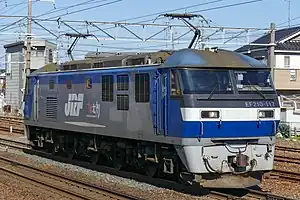 JR Freight EF210 electric locomotive EF210-117 in January 2019 | |||||||||||||||||||||||
| |||||||||||||||||||||||
| |||||||||||||||||||||||
| |||||||||||||||||||||||
| |||||||||||||||||||||||
The Class EF210 (EF210形) is a Bo-Bo-Bo wheel arrangement DC electric locomotive type operated by Japan Freight Railway Company (JR Freight) on freight services in Japan.
The locomotives are built at the Kawasaki Heavy Industries factory in Kobe. Based at Okayama, Shin-Tsurumi, and Suita (Osaka) depots, they are primarily used on freight on the Tokaido Main Line and Sanyo Main Line, replacing Class EF66 locomotives.
As of 1 April 2016, 101 EF210s were operated by JR Freight, based at Shin-Tsurumi (Kawasaki), Suita (Osaka), and Okayama depots.[2]
Variants
- Class EF210-901, prototype
- Class EF210-0, full-production version
- Class EF210-100
- Class EF210-300, banking locomotives
EF210-901
The pre-production prototype, EF210-901, was delivered to Shin-Tsurumi depot in 1996.
 EF210-901 in March 2010
EF210-901 in March 2010
EF210-0 full-production version
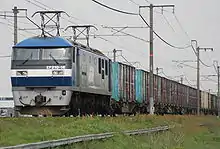
Following evaluation of the prototype version, the first full-production locomotive, EF210-1, was delivered to Okayama in July 1998. A number of minor improvements were incorporated, with the main external differences from the prototype being as follows.
- Traction motors changed from FMT3 (565 kW) to FMT4 type (565 kW)
- "ECO-POWER Momo Taro" logo on bodyside
- Reduced bogie size from 2,600 mm to 2,500 mm.
All 18 of the EF210-0s are allocated to Okayama Depot.[2]
EF210-100
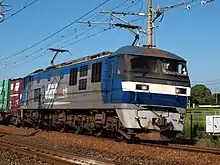
The EF210-100 sub-class incorporates a number of minor improvements, including the use of single-arm pantographs, and IGBT replacing GTO.
EF210-100s are based at Okayama, Shin-Tsurumi, and Suita (Osaka) depots, with 73 locomotives in operation as of 1 April 2016.[2]
EF210-300
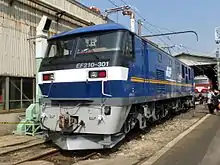
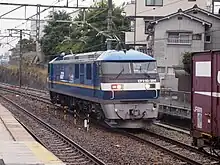
The EF210-300 subclass was introduced from March 2013 to replace the dedicated Class EF67 banking locomotives that assist freight trains on the steeply-graded "Senohachi" section of the Sanyō Main Line between Seno and Hachihonmatsu.[3] The first locomotive, EF210-301, was delivered from Kawasaki Heavy Industries in Hyogo on 3 September 2012.[4] It entered service from the start of the revised timetable on 16 March 2013.[5] The second locomotive entered service from 28 April 2013.[6]
The locomotives are painted in an overall-blue livery with yellow lining.[4]
Fleet details
| No. | Manufacturer | Date delivered |
|---|---|---|
| EF210-301 | Kawasaki Heavy Industries | September 2012[4] |
| EF210-302 | Kawasaki Heavy Industries | April 2013[6] |
| EF210-303 | Kawasaki Heavy Industries | 2013[7] |
| EF210-304 | Kawasaki Heavy Industries | July 2015[7] |
| EF210-305 | Kawasaki Heavy Industries | August 2015[8] |
| EF210-306 | Kawasaki Heavy Industries | September 2015[9] |
| EF210-307 | Kawasaki Heavy Industries | September 2015[10] |
| EF210-308 | Kawasaki Heavy Industries | October 2015[10] |
| EF210-309 | Kawasaki Heavy Industries | October 2015[10] |
| EF210-310 | Kawasaki Heavy Industries | August 2017[11] |
| EF210-311 | Kawasaki Heavy Industries | August 2017[12] |
| EF210-312 | Kawasaki Heavy Industries | December 2018[13] |
| EF210-313 | Kawasaki Heavy Industries | January 2019[13] |
| EF210-314 | Kawasaki Heavy Industries | January 2019[13] |
| EF210-315 | Kawasaki Heavy Industries | February 2019[13] |
Classification
The EF210 classification for this locomotive type is explained below. As with previous locomotive designs, the prototype is numbered EF210-901, with subsequent production locomotives numbered from EF210-1 onward.
- E: Electric locomotive
- F: Six driving axles
- 210: DC locomotive with AC motors
References
- 1 2 3 JR全車輌ハンドブック2006 [JR Rolling Stock Handbook 2006]. Japan: Neko Publishing. 2006. ISBN 978-4-7770-0453-9.
- 1 2 3 Shibata, Togo (August 2016). 最新JR貨物の電気機関車と話題の貨物列車 [Latest: JR Freight electric locomotives and popular freight trains]. Tetsudo Daiya Joho Magazine (in Japanese). Vol. 45, no. 388. Japan: Kotsu Shimbun. p. 33.
- ↑ "JR貨物 EF210形300番代とEH800形900番代を新作" [JR Freight to build new EF210-300 and EH800-900]. Tetsudō Daiya Jōhō Magazine. Vol. 41, no. 341. Japan: Kotsu Shimbun. September 2012. p. 70.
- 1 2 3 "EF210-301が川崎重工から出場" [EF210-301 delivered from Kawasaki Heavy Industries]. Japan Railfan Magazine Online (in Japanese). Japan: Koyusha Co., Ltd. 4 September 2012. Retrieved 4 September 2012.
- ↑ 平成25(2013)年3月16日JRグループダイヤ改正 [16 March 2013 JR Group timetable revision]. Japan Railfan Magazine (in Japanese). Vol. 53, no. 626. Japan: Koyusha Co., Ltd. June 2013. p. 71.
- 1 2 "EF210-302,早くも営業運転開始" [EF210-302 quickly into revenue service]. Japan Railfan Magazine Online (in Japanese). Japan: Koyusha Co., Ltd. 1 May 2013. Retrieved 1 May 2013.
- 1 2 EF210-304が川崎重工から出場 [EF210-304 delivered from Kawasaki Heavy Industries]. Japan Railfan Magazine Online (in Japanese). Japan: Koyusha Co., Ltd. 28 July 2015. Retrieved 28 July 2015.
- ↑ EF210-305が川崎重工から出場 [EF210-305 delivered from Kawasaki Heavy Industries]. Japan Railfan Magazine Online (in Japanese). Japan: Koyusha Co., Ltd. 19 August 2015. Retrieved 19 August 2015.
- ↑ EF210-306が出場 [EF210-306 delivered]. Japan Railfan Magazine Online (in Japanese). Japan: Koyusha Co., Ltd. 2 September 2015. Retrieved 2 September 2015.
- 1 2 3 甲種鉄道車両輸送計画表 [Rolling stock delivery schedule]. Tetsudō Daiya Jōhō Magazine (in Japanese). Vol. 44, no. 378. Japan: Kotsu Shimbun. October 2015. p. 125.
- ↑ EF210-310が営業運転を開始 [EF210-310 enters revenue service]. Japan Railfan Magazine Online (in Japanese). Japan: Koyusha Co., Ltd. 26 August 2017. Archived from the original on 28 August 2017. Retrieved 28 August 2017.
- ↑ EF210-311 運用開始 [EF210-311 enters revenue service]. Tetsudo Hobidas (in Japanese). Japan: Neko Publishing Co., Ltd. 28 August 2017. Archived from the original on 28 August 2017. Retrieved 28 August 2017.
- 1 2 3 4 貨物ちゃんねる EF210配置表 [freight channel EF210 arrange table].
External links
- JR Freight website (in Japanese)